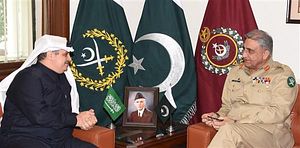Three years after the Pakistani parliament passed a resolution declaring neutrality in the conflict between a Saudi Arabia-led coalition and Yemen’s Houthi rebels, the country has agreed to send more troops to the kingdom.
Last week, Pakistan’s Chief of Army Staff General Qamar Javed Bajwa met with Saudi Ambassador to Pakistan Nawaf Saeed Al-Maliki at the Army’s General Headquarters in Rawalpindi. After their meeting, the Pakistani military’s Inter-Services Public Relations put out a short statement noting that a “Pakistan Army contingent is being sent to KSA on training and advise mission.”
The statement added that “These or troops already there will not be employed outside KSA,” presumably to underline that any Pakistani troops would be deployed for border and internal security purposes in Saudi Arabia—not for combat missions in Yemen.
According to Asia Times, the prospect of a Pakistani deployment to Saudi Arabia has been under discussion for some time between Saudi Arabia’s ambitious Crown Prince Mohammed bin Salman, the primary mover behind the Yemeni campaign in March 2015, who met with General Bajwa in Riyadh earlier this month.
The request for Pakistani assistance comes amid intensifying counterattacks by Houthi fighters against Saudi Arabia’s southern province of Najran, which borders Houthi-held parts of Yemen. The Houthis have additionally been firing ballistic missiles into Saudi Arabia, targeting cities including Riyadh.
Meanwhile, in Islamabad, the Army’s announcement has spurred a domestic political crisis, with the opposition accusing the government of defying the parliament-sanctioned neutrality declaration. Defense Minister Khurram Dastgir Khan has been threatened with “contempt of parliament” proceedings, after refusing to clarify the contours of the new deployment.
The Army’s decision to announce the deployment through a press release sheds light on a civil-military divide in the decision. Pakistan’s powerful military has historically steered the country’s foreign and security policy, especially with key military partners like Saudi Arabia.
Accordingly, Pakistan Senate Chairman Raza Rabbani noted that parliament learned of the deployment “through a press release,” which he added was an insult by the executive branch against the legislature.
The defense minister, clarifying the Army’s move, said that the deployment would not change Pakistan’s neutrality posture. He also clarified that 1,000 Pakistani troops would be sent to Saudi Arabia, supplementing 1,600 that are already stationed in the country to secure Islamic holy sites and serve in other internal security roles.
In 2015, the Pakistani parliament resolved to maintain neutrality as the Saudi-led coalition began striking Houthi targets in Yemen as part of Operation Decisive Storm to avoid being drawn into a broader sectarian conflict between Saudi Arabia and Iran.
The deployment of troops to Saudi Arabia may raise tensions between Tehran and Islamabad.

































